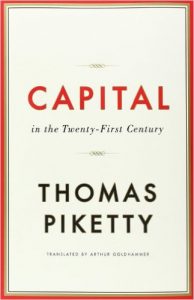
Thomas Piketty’s “Capital in the Twenty-First Century” is a brilliant assemblage of economic facts and data from the 1800s to this millennium. Piketty uses this data to paint a vivid picture of the economic inequality existent in major countries and regions of the world. The book not only provides raw data and analysis of the economic history of countries, it suggests clear policies that can remedy the inequality found in the wealth distribution among people in different countries.
Surprisingly, “Capital in the Twenty-First Century” was originally written in French, which the mother tongue of Thomas Piketty, a professor at the Paris school of Economics and translated flawlessly by Arthur Goldhammer. The effort put in by the author and translator makes this book readable and understandable by anyone who has little or no knowledge of economics. It sure will be an absolute delight for those well-grounded in Economics and statistics. The book discusses pertinent topics that a layman should have knowledge of, from the excellent explanation of the function of central banks, to the explanation that the recent rise of “super managers” is a direct result of conservative revolution of the 1980’s and much more topics.
What makes this book thick is that its claims and recommendations are backed by concrete data, also the fact that the volume of data processed is larger than any economist has so far amassed. Consequently, “Capital in the Twenty-First Century” can serve as an authoritative source of data when conducting research on economic inequality or making an analysis of the economies of the countries that have their economic data put under scrutiny in the book.
Those who belong to the conservative school of thought may attempt putting aside the opinions and facts unearthed in this book’s analysis, however, the accuracy of the facts are staggering, therefore, acknowledging its brilliance is inevitable.
Anyone, who reads this book, ought to find distressing, stimulating, and valuable. I can safely recommend that this book should be read by all and should be in the library of anyone who is an Economist or is interested in the world of finance and economics and hopes to engage in an informed discussion of the Economic landscape of the world authoritatively.
On the whole, you can enjoy this book by poring over its facts from statistical and economic analysis and drawing your own conclusion on the way forward.





